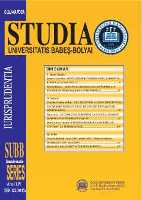MODURILE GENERALE DE DOBÂNDIRE ALE BUNURILOR TEMPORALE DE CĂTRE BISERICĂ
GENERAL MODES OF TEMPORAL ASSET ACQUIRED BY THE CHURCH
Author(s): Liviu Marius HarosaSubject(s): Law, Constitution, Jurisprudence
Published by: Studia Universitatis Babes-Bolyai
Summary/Abstract: Consequent to its innate right to possess goods, the Church may acquire temporal goods required for its operation and for the achievement of the worldly and spiritual goals it pursues. The right to acquire goods is an attribute inherent to personality, for private individuals and legal entities alike. Both CIC 1983 (for the Roman-Catholic Church) and CCEO (for the Uniate Church) on the one hand, and the Statutes and Regulations on the administration of church goods currently employed within the Romanian Orthodox Church on the other hand, stipulate various methods via which goods may become part of the patrimony of either the Church or public and private legal entities within the Church; in certain cases, the goods may come into the possession of private individuals connected in one way or another with the Church. The methods by which these temporal goods may be acquired are various and hard to define in precise and unitary patterns. The means by which these temporal goods become part of the Church patrimony may be governed on the one hand by natural, canon, civil (canonization of civil law), or mixed law, and as such they may be original (via occupation, accession or incorporation, prescription) or derived (voluntary dispositions inter vivos, mortis causa, legal or testamentary succession, contracts, legal acts, fusions, divisions, absorptions or extinctions of legal entities, etc.) and of public (taxes, duties) or private law on the other hand.
Journal: Studia Universitatis Babes Bolyai - Iurisprudentia
- Issue Year: 54/2009
- Issue No: 1
- Page Range: 25-57
- Page Count: 33
- Language: Romanian

